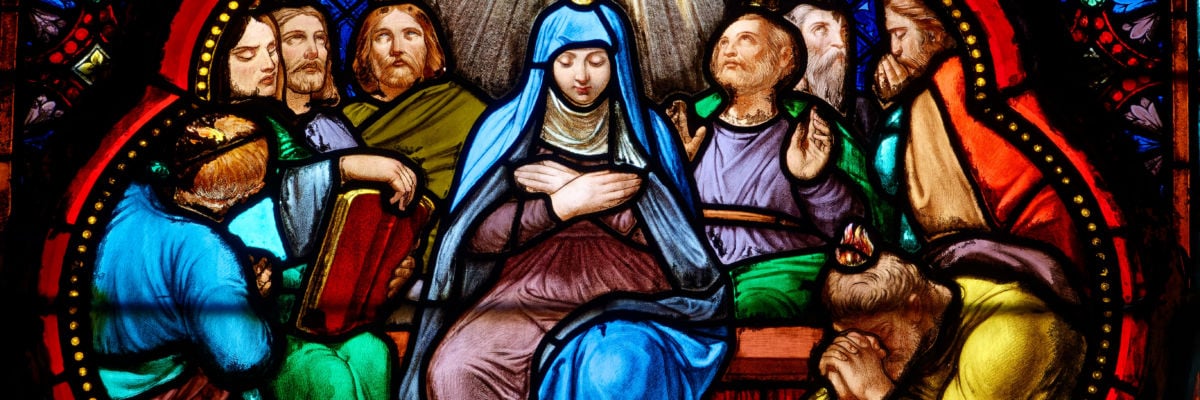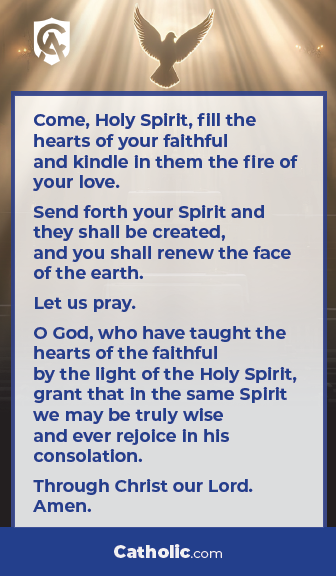
Feast of Pentecost
Pentecost Sunday 2025, celebrated on June 8, marks one of the most important feasts in the Church’s liturgical year. Occurring fifty days after Easter Sunday, Pentecost commemorates the descent of the Holy Spirit upon the apostles and the Blessed Virgin Mary. Our Lord sent his Holy Spirit to empower them to preach the gospel to the whole world (Acts 2; see Acts 1:4-8). Often called the “birthday of the Church,” this wondrous day reminds us of how Jesus fully equips his Church to carry out her Great Commission to “make disciples all nations” (Matt. 28:18-20; see Isa. 49:6, 22).
What Is Pentecost?
Pentecost is a Christian celebration that commemorates the day when the Holy Spirit descended upon the followers of Jesus Christ:
And suddenly a sound came from heaven like the rush of a mighty wind, and it filled all the house where they were sitting (Acts 2:2).
And “tongues as of fire” came to rest on each of them (Acts 2:3). The apostles began speaking in various languages, proclaiming the gospel to Jews of every nation, who gathered in Jerusalem for the feast. Additionally, this miraculous event marked the beginning of the apostles’ public ministry, and thus the beginning of the Church’s “making disciples of all nations” (Matt. 28:18-20).
When Is Pentecost 2025?
The date of Pentecost 2025 falls on Sunday, June 8. The celebration always lands on the fiftieth and final day of the Easter season, reflecting its origin from the Greek word pentēkostē, meaning “fiftieth.” Also, Pentecost is closely linked with the Jewish Feast of Weeks (Shavuot). This takes place fifty days after Passover, celebrating the wheat harvest and the giving of the law at Mount Sinai. Furthermore, prefiguring how the Holy Spirit equipped God’s people to proclaim and live fully Christ’s new law of grace (Matt. 5:17-18).
What Kingdom Did Jesus Establish on Pentecost?
For centuries, the Jewish people anticipated a Messiah king to restore the Davidic kingdom of Israel in a New Covenant (2 Sam. 7:12-13; Jer. 31:31-33). This Messiah king would wield political power even greater than Kings David and Solomon had in the Old Covenant—a rule which would impact the whole world (see Amos 9:11–12; Isa. 11:1, 10).
Since the apostles thought similarly, just before his Ascension, they ask Jesus,
“Lord, will you at this time restore the kingdom to Israel?” (Acts 1:6).
However, in the kingdom of God, no human ruler wages battles over merely earthly matters. Instead, Jesus Christ, the King of kings (Rev. 17:14), reigns from on high in heaven. He strengthens his Church to fight a greater war against her true and undeniable enemies: the devil and his demonic forces (Eph. 6:10-12). Through the seven sacraments, the word of God, and other spiritual “weapons of warfare” (2 Cor. 10:3-4), the Church drives them back.
When the Holy Spirit descends upon the apostles on Pentecost, their doubts disappear. As a result, they fully understand that Jesus is a far greater king (Luke 1:32–33). Unlike his royal Davidic namesake, who died and suffered bodily corruption (Acts 1:27–33), Jesus reigns with eternal glory.
Peter Leads Christ’s Kingdom on Earth
The restored kingdom of Israel is precisely the one Catholic Church Jesus founded, the “the kingdom of heaven” against which “the powers of death shall not prevail” (Matt. 16:18-19).
So, who visibly leads Christ’s kingdom on earth and carries out the Church’s mission to “make disciples of all nations”? (Matt. 28:18-20). In the Old Covenant, a prime minister or steward governed over the house of King David. Likewise, in the New Covenant, Peter receives “the keys to the kingdom of heaven” (Matt. 16:18-19), reflecting a special authority (see Isa. 22:15-25). Peter and his successors lead the Church with the power to “bind and loose” (Matt. 16:18–19; Luke 22:31-32), while the other apostles and their successors govern with them under Peter’s leadership (Matt. 18:15-18; see Acts 1:15-26).
Why Is Pentecost Sunday Important in the Catholic Faith?
For Catholics, Pentecost Sunday is not merely a historical commemoration. It’s a great liturgical celebration, memorializing the day on which Jesus sent the Holy Spirit to inaugurate and ignite the Church’s public mission:
“You shall receive power when the Holy Spirit has come upon you” (Acts 1:8).
Furthermore, Pentecost marks the day the Holy Spirit empowers the Church to act boldly in Jesus’ name.
Liturgically, it also concludes the Easter season. During Pentecost Mass, the Church celebrates with rich substance and symbolism. For example, when the sacrament of confirmation is conferred, it strengthens today’s disciples in the present day to bear faithful witness. Additionally, priests wear red vestments to recall the tongues of fire that rested on the apostles. Moreover, the Church prays for the gifts of the Holy Spirit to be poured out once again. In some Catholic traditions, rose petals even fall from the ceiling to represent the descent of the Holy Spirit.
The Holy Spirit and Pentecost
On Pentecost, the Holy Spirit transforms the frightened apostles into bold evangelists. Through his presence, the Spirit brings unity, guidance, and sanctification. Catholics first receive the Holy Spirit at baptism (Acts 2:37-39; 22:16) and later in fullness at confirmation, continuing the Pentecost tradition in every believer’s life (see Acts 8:14–17; 19:1-7). Furthermore, the seven gifts of the Holy Spirit—wisdom, understanding, counsel, fortitude, knowledge, piety, and fear of the Lord—remain central to our life in Christ Jesus (Isa. 11:2-3).
To prepare your heart for this feast, consider praying the Pentecost Novena in 2025. This powerful devotion begins nine days before Pentecost Sunday and mirrors the apostles, the Blessed Mother, and other disciples who prayerfully waited for the Holy Spirit after the Ascension.
Free PDF Download | Prayer to the Holy Spirit
Old Testament Roots of Pentecost
The Feast of Pentecost is rooted in Judaism. Known as Shavuot, or the Feast of Weeks, it celebrates the end of the wheat harvest and also commemorates the Old Covenant God established with Israel (see Exod. 20—24). In a profound way, Pentecost invites Catholics to reflect on how, in the New Covenant, the Holy Spirit strengthens us to live the law of God. Including the law written on our hearts (Rom. 2:14-16), and a law which Christ fulfilled and elevated (Matt. 5:17-18; see Matt. 5-7 in general). Additionally, many consider Pentecost Babel’s reversal.
Was Pentecost Really the ‘Birthday’ of the Church?
Referring to Pentecost as the “birthday of the Church” is a helpful expression, but it’s more theological shorthand than a literal definition. As Catholic Answers apologist Tim Staples affirms, the Church was already taking shape during Christ’s public ministry, particularly through his teachings, the calling of the apostles, and the institution of six of the seven sacraments.
What happened on Pentecost Sunday, however, was a decisive turning point: the Holy Spirit descended upon the apostles in giving them the sacrament of confirmation (Acts 2), fully equipping them to begin their public mission. About three thousand people were baptized that day (Acts 2:41), making it the Church’s first visible and missionary act, her first evangelistic outreach to the world. In this sense, Pentecost marks the moment the Church went from formation to proclamation, from preparation to mission.
So, while not the Church’s “birthday” in a strict chronological sense, Pentecost is rightly celebrated as the day the Church emerged boldly into the world—Spirit-filled, sacramental, and apostolic.
Pentecost Traditions and Symbols
Catholic parishes around the world commemorate Pentecost Sunday 2025 with vibrant liturgies. Some distinctive norms, rites, and customs include:
- Red vestments and decorations, symbolizing fire of the Holy Spirit and zeal.
- Confirmation rites, in which the sacrament of the Holy Spirit is conferred.
- Processions and rose petal drops in Rome and other parts of Europe.
- Singing the Veni Sancte Spiritus (‘Come Holy Spirit’), the “Golden Sequence” in which the Holy Spirit is invoked. This prayer is also prayed when the cardinal electors process into a papal conclave to elect a new pope.
How Do Orthodox Christians Celebrate Pentecost?
Because of some differences in their liturgical calendars, Eastern Orthodox Christians usually celebrate Pentecost on a different day than Catholics. However, Pentecost 2025 is on the same day. In addition, Orthodox observances include similar themes. They hold special services called Kneeling Prayers and celebrate Trinity Sunday the day after Pentecost. Green is often worn instead of red, representing renewal and eternal life.
Come, Holy Spirit
Pentecost is more than a past event; it is a present reality. The same Holy Spirit who descended in fire now dwells in the hearts of the faithful, guiding the Church until Christ returns at his Second Coming. May we, like the apostles, receive and nourish the Spirit with courage and joy, proclaiming Jesus to the ends of the earth.
Related Content
Podcasts
How Does the Holy Spirit Work in Our Lives?
Why Catholics Need the Sacraments for Salvation
Articles
Q & A
Apostles Spoke Different Languages (Tongues) on Pentecost
What Had to Precede Pentecost?
Books
20 Answers: Seasons and Feasts
The Early Church Was the Catholic Church
Resource
[i] As the Catechism of the Catholic Church (CCC) provides,
The Church was made manifest to the world on the day of Pentecost by the outpouring of the Holy Spirit.1 The gift of the Spirit ushers in a new era in the “dispensation of the mystery” the age of the Church, during which Christ manifests, makes present, and communicates his work of salvation through the liturgy of his Church, “until he comes.”2 In this age of the Church Christ now lives and acts in and with his Church, in a new way appropriate to this new age. He acts through the sacraments in what the common Tradition of the East and the West calls “the sacramental economy”; this is the communication (or “dispensation”) of the fruits of Christ’s Paschal mystery in the celebration of the Church’s “sacramental” liturgy (CCC 1076).



